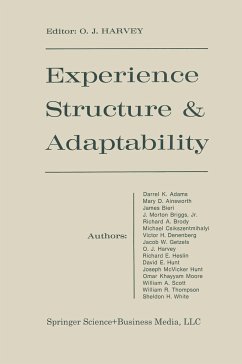- Broschiertes Buch
- Merkliste
- Auf die Merkliste
- Bewerten Bewerten
- Teilen
- Produkt teilen
- Produkterinnerung
- Produkterinnerung
The translation of this volume has been a long and sometime arduous journey giving nearly literal meaning to the Latin term translatus, meaning to carry across. In fact, it required many journeys both geographically, between Canada and Germany, and fig uratively, between German and English language, thought, and culture; between the mind of a German professor and that of his American colleague. Whether or not it was all worthwhile must be left to the reader's judgment, but let me outline the rationale for embarking on this venture. When the first German edition of this book appeared in 1980 it…mehr
Andere Kunden interessierten sich auch für
![Motivation, Intention, and Volition Motivation, Intention, and Volition]() Motivation, Intention, and Volition75,99 €
Motivation, Intention, and Volition75,99 €![Motivation, Konflikt und Handlungskontrolle Motivation, Konflikt und Handlungskontrolle]() J. KuhlMotivation, Konflikt und Handlungskontrolle69,99 €
J. KuhlMotivation, Konflikt und Handlungskontrolle69,99 €![Experience Structure & Adaptability Experience Structure & Adaptability]() Experience Structure & Adaptability39,99 €
Experience Structure & Adaptability39,99 €![Erlernte Hilflosigkeit, Handlungskontrolle und Leistung Erlernte Hilflosigkeit, Handlungskontrolle und Leistung]() Joachim Stiensmeier-PelsterErlernte Hilflosigkeit, Handlungskontrolle und Leistung54,99 €
Joachim Stiensmeier-PelsterErlernte Hilflosigkeit, Handlungskontrolle und Leistung54,99 €![Panic and Phobias 2 Panic and Phobias 2]() Panic and Phobias 277,99 €
Panic and Phobias 277,99 €![Kognitive Dissonanz Kognitive Dissonanz]() Jürgen BeckmannKognitive Dissonanz49,99 €
Jürgen BeckmannKognitive Dissonanz49,99 €![A Model for Personality A Model for Personality]() A Model for Personality84,99 €
A Model for Personality84,99 €-
-
-
The translation of this volume has been a long and sometime arduous journey giving nearly literal meaning to the Latin term translatus, meaning to carry across. In fact, it required many journeys both geographically, between Canada and Germany, and fig uratively, between German and English language, thought, and culture; between the mind of a German professor and that of his American colleague. Whether or not it was all worthwhile must be left to the reader's judgment, but let me outline the rationale for embarking on this venture. When the first German edition of this book appeared in 1980 it was acclaimed not only by German scholars but by those outside the German-speaking community as well. In fact, it received extremely favorable reviews, even in English-language journals, which is unusual for a foreign text. It was recognized that this was far more than just another text book on motivation. For one thing, it exposed and examined the multi faceted roots that have contributed to contemporary theory and research in motivation. The author skillfully examined the motivational concepts, theories, and research that have emanated from many areas of psychology such as learning theory, social psychol ogy, personality, psychoanalysis, and clinical psychology.
Hinweis: Dieser Artikel kann nur an eine deutsche Lieferadresse ausgeliefert werden.
Hinweis: Dieser Artikel kann nur an eine deutsche Lieferadresse ausgeliefert werden.
Produktdetails
- Produktdetails
- Verlag: Springer / Springer Berlin Heidelberg / Springer, Berlin
- Artikelnr. des Verlages: 978-3-642-75963-5
- Softcover reprint of the original 1st ed. 1991
- Seitenzahl: 528
- Erscheinungstermin: 16. Dezember 2011
- Englisch
- Abmessung: 270mm x 193mm x 29mm
- Gewicht: 1130g
- ISBN-13: 9783642759635
- ISBN-10: 3642759637
- Artikelnr.: 36115627
- Herstellerkennzeichnung
- Springer-Verlag GmbH
- Tiergartenstr. 17
- 69121 Heidelberg
- ProductSafety@springernature.com
- Verlag: Springer / Springer Berlin Heidelberg / Springer, Berlin
- Artikelnr. des Verlages: 978-3-642-75963-5
- Softcover reprint of the original 1st ed. 1991
- Seitenzahl: 528
- Erscheinungstermin: 16. Dezember 2011
- Englisch
- Abmessung: 270mm x 193mm x 29mm
- Gewicht: 1130g
- ISBN-13: 9783642759635
- ISBN-10: 3642759637
- Artikelnr.: 36115627
- Herstellerkennzeichnung
- Springer-Verlag GmbH
- Tiergartenstr. 17
- 69121 Heidelberg
- ProductSafety@springernature.com
1 The Study of Motivation: Issues and Approaches.- Everyday Experiences and Three Issues.- Naive Explanations of Behavior.- An Explanation for Nonoccurring Behavior.- The Consistency Paradox.- Person-Specific Behavior.- Motive as an Explanatory Concept.- Motivation.- Intention Formation and Volition.- Action.- Postaction Phase.- The Chapter in Retrospect.- 2 Historical Trends in Motivation Research.- The Generation of Pioneers.- The Psychology of the Will.- The Instinct Theory Approach.- Personality Theories.- Associationist Theories.- Preview.- 3 Trait Theories of Motivation.- Trait Theories of Motivation: Motives.- Basic Emotions as a Rudimentary Motivation System.- Taxonomic Problems of Motive Classification Systems.- 4 Situational Determinants of Behavior.- Stimulus-Response Association.- Need and Drive.- Drive Theory.- Acquired Drives, Drive as a Strong Stimulus.- Conflict Theory.- Activation Theories.- Toward a Cognitive Appraisal of the Situation.- Emotion as an Outcome of a Cognitive Appraisal.- Appraisal of Threatening Situations.- Cognitive Balance.- Cognitive Dissonance.- Cognitive Appraisal Theories and Motivational Psychology.- 5 Motivation as a Function of Expectancy and Incentive.- Field Theory.- Experimental Contributions of Field Theory.- Tolman's Analysis of Goal-Directed Behavior.- Expectancy and Incentive Conceptualized in S-R Terms.- More Recent Developments.- Expectancy-Value Theories.- Decision Theory.- Level of Aspiration and the Theory of Resultant Valence.- Atkinson's Risk-Taking Model.- Rotter's Social Learning Theory.- Instrumentality Theory.- 6 Volition: Implementation of Intentions.- Ach's Psychology of the Will.- Three Types of Volition Problems.- Kuhl's Theory of Action Control.- The Rubicon Model of Action Phases.- 7 Anxiety.-General Anxiety.- Test Anxiety.- 8 Achievement Motivation.- Evolutionary Psychological Perspectives.- Motive Measurement.- Behavioral Correlates of Motive Differences.- Socio-Cultural Motive Indices and Economic Growth.- Sex-Differences and "Fear of Success".- The Risk-Taking Model as the Dominant Research Orientation.- Choice: Maximal Product of Expectancy and Incentive.- Persistence.- "Inertial Tendency" of the Unfinished.- Performance Outcomes.- Efficiency of Task Performance.- Cumulative Achievement.- Reference Norms for Performance Outcomes.- The Preeminence of Individual Reference Norms within Motivation.- 9 Altruism.- Sociobiological Perspectives.- Research Direction.- Situational Conditions.- Norms.- Evaluative Perspectives for the Donor and Recipient of Aid.- Empathy.- Personality Dispositions.- Towards a Motivational Model of Altruism.- Altruism within an Expectancy-Times-Value Model.- 10 Aggression.- Definitions.- Biological Perspectives.- Norms.- Evolution of the Research Activity.- Situational Factors in Aggressive Behavior.- An Attributional Analysis.- Emotion of Anger and General State of Arousal.- Individual Differences and Preliminary Conceptualization of the Motive.- Aggression as Action Goal: The Catharsis Hypothesis.- 11 Social Bonding: Affiliation Motivation and Intimacy Motivation.- Ontogenetic and Phylogenetic Aspects of Social Bonding.- Affiliation Motivation.- Need Affiliation.- Physiological and Neuroimmunological Correlates.- Questionnaires.- Intimacy Motivation.- 12 Power Motivation.- Motive Base.- Sources of Power.- Power Behavior.- Biological Aspects.- Individual Differences in Power Behavior: Power Motive.- Definitions of Motive.- Combination of Values and Expectancy.- Inhibited Power Motive, Immune System, and Health-RelatedConsequences.- Constellations of Power, Achievement, and Affiliation.- 13 Attribution Theory.- Causal Attribution in the Motivational Process.- Historical Review of the Issues and Related Research Areas.- Fundamental Positions and Models.- Four Broader Issues.- The Motivational Bias Question.- Perspective Discrepancy between Actor and Observer.- Attribution of Responsibility.- 14 Attribution and Achievement Behavior.- Categories of Causal Dimensions.- Constellation of Conditions for Invoking Particular Causal Elements.- Motive-Dependent Differences in Attributions.- Consequences of the Attribution of Success and Failure.- Location Dimension: Self-Evaluative Emotions.- Control Dimension: Evaluation of Others and Self Affect.- Causal Dimensions and Emotions.- Effects on Behavior.- Self-Evaluation a Motivation Principle.- Application: "Attribution Therapy".- Contributions of Attribution Theory to Achievement Motivation Theory.- 15 Expanded Perspectives.- Intrinsic and Extrinsic Motivation.- An Expanded Motivation Model.- Motivational Shifts: Atkinson and Birch's "Dynamic Action Model".- Learned Helplessness.- Self-Concepts.- Name Index.
1 The Study of Motivation: Issues and Approaches.- Everyday Experiences and Three Issues.- Naive Explanations of Behavior.- An Explanation for Nonoccurring Behavior.- The Consistency Paradox.- Person-Specific Behavior.- Motive as an Explanatory Concept.- Motivation.- Intention Formation and Volition.- Action.- Postaction Phase.- The Chapter in Retrospect.- 2 Historical Trends in Motivation Research.- The Generation of Pioneers.- The Psychology of the Will.- The Instinct Theory Approach.- Personality Theories.- Associationist Theories.- Preview.- 3 Trait Theories of Motivation.- Trait Theories of Motivation: Motives.- Basic Emotions as a Rudimentary Motivation System.- Taxonomic Problems of Motive Classification Systems.- 4 Situational Determinants of Behavior.- Stimulus-Response Association.- Need and Drive.- Drive Theory.- Acquired Drives, Drive as a Strong Stimulus.- Conflict Theory.- Activation Theories.- Toward a Cognitive Appraisal of the Situation.- Emotion as an Outcome of a Cognitive Appraisal.- Appraisal of Threatening Situations.- Cognitive Balance.- Cognitive Dissonance.- Cognitive Appraisal Theories and Motivational Psychology.- 5 Motivation as a Function of Expectancy and Incentive.- Field Theory.- Experimental Contributions of Field Theory.- Tolman's Analysis of Goal-Directed Behavior.- Expectancy and Incentive Conceptualized in S-R Terms.- More Recent Developments.- Expectancy-Value Theories.- Decision Theory.- Level of Aspiration and the Theory of Resultant Valence.- Atkinson's Risk-Taking Model.- Rotter's Social Learning Theory.- Instrumentality Theory.- 6 Volition: Implementation of Intentions.- Ach's Psychology of the Will.- Three Types of Volition Problems.- Kuhl's Theory of Action Control.- The Rubicon Model of Action Phases.- 7 Anxiety.-General Anxiety.- Test Anxiety.- 8 Achievement Motivation.- Evolutionary Psychological Perspectives.- Motive Measurement.- Behavioral Correlates of Motive Differences.- Socio-Cultural Motive Indices and Economic Growth.- Sex-Differences and "Fear of Success".- The Risk-Taking Model as the Dominant Research Orientation.- Choice: Maximal Product of Expectancy and Incentive.- Persistence.- "Inertial Tendency" of the Unfinished.- Performance Outcomes.- Efficiency of Task Performance.- Cumulative Achievement.- Reference Norms for Performance Outcomes.- The Preeminence of Individual Reference Norms within Motivation.- 9 Altruism.- Sociobiological Perspectives.- Research Direction.- Situational Conditions.- Norms.- Evaluative Perspectives for the Donor and Recipient of Aid.- Empathy.- Personality Dispositions.- Towards a Motivational Model of Altruism.- Altruism within an Expectancy-Times-Value Model.- 10 Aggression.- Definitions.- Biological Perspectives.- Norms.- Evolution of the Research Activity.- Situational Factors in Aggressive Behavior.- An Attributional Analysis.- Emotion of Anger and General State of Arousal.- Individual Differences and Preliminary Conceptualization of the Motive.- Aggression as Action Goal: The Catharsis Hypothesis.- 11 Social Bonding: Affiliation Motivation and Intimacy Motivation.- Ontogenetic and Phylogenetic Aspects of Social Bonding.- Affiliation Motivation.- Need Affiliation.- Physiological and Neuroimmunological Correlates.- Questionnaires.- Intimacy Motivation.- 12 Power Motivation.- Motive Base.- Sources of Power.- Power Behavior.- Biological Aspects.- Individual Differences in Power Behavior: Power Motive.- Definitions of Motive.- Combination of Values and Expectancy.- Inhibited Power Motive, Immune System, and Health-RelatedConsequences.- Constellations of Power, Achievement, and Affiliation.- 13 Attribution Theory.- Causal Attribution in the Motivational Process.- Historical Review of the Issues and Related Research Areas.- Fundamental Positions and Models.- Four Broader Issues.- The Motivational Bias Question.- Perspective Discrepancy between Actor and Observer.- Attribution of Responsibility.- 14 Attribution and Achievement Behavior.- Categories of Causal Dimensions.- Constellation of Conditions for Invoking Particular Causal Elements.- Motive-Dependent Differences in Attributions.- Consequences of the Attribution of Success and Failure.- Location Dimension: Self-Evaluative Emotions.- Control Dimension: Evaluation of Others and Self Affect.- Causal Dimensions and Emotions.- Effects on Behavior.- Self-Evaluation a Motivation Principle.- Application: "Attribution Therapy".- Contributions of Attribution Theory to Achievement Motivation Theory.- 15 Expanded Perspectives.- Intrinsic and Extrinsic Motivation.- An Expanded Motivation Model.- Motivational Shifts: Atkinson and Birch's "Dynamic Action Model".- Learned Helplessness.- Self-Concepts.- Name Index.








